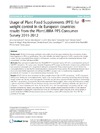Identificador persistente para citar o vincular este elemento:
https://accedacris.ulpgc.es/jspui/handle/10553/42534
| Título: | Usage of Plant Food Supplements (PFS) for weight control in six European countries: results from the PlantLIBRA PFS Consumer Survey 2011-2012 | Autores/as: | Garcia-Alvarez, Alicia Mila-Villarroel, Raimon Ribas-Barba, Lourdes Egan, Bernadette Badea, Mihaela Maggi, Franco M. Salmenhaara, Maija Restani, Patrizia Serra-Majem, Luis Isoniemi, M. Uusitalo, L. de Klein, S. Meissner, E.M. Bruno, F. Marculescu, A. Dima, L. Knaze, V. Raats, M.M. Hodgkins, C. |
Clasificación UNESCO: | 3206 Ciencias de la nutrición | Palabras clave: | Body mass index European Plant food supplements PlantLIBRA survey Weight control |
Fecha de publicación: | 2016 | Publicación seriada: | BMC Complementary and Alternative Medicine | Resumen: | Background: Obesity is increasing worldwide and weight-control strategies, including the consumption of plant food supplements (PFS), are proliferating. This article identifies the herbal ingredients in PFS consumed for weight control and by overweight/obese dieters in six European countries, and explores the relationship between their consumption and their self-reported BMI. Methods: Data used were a subset from the PlantLIBRA PFS Consumer Survey 2011-2012, a retrospective survey of 2359 PFS consumers. The survey used a bespoke frequency-of-PFS-usage questionnaire. Analyses were performed in two consumer subsamples of 1) respondents taking the products for "body weight reasons", and 2) "dieters for overweight/obesity", to identify the herbal ingredients consumed for these reasons. The relationship between the 5 most consumed herbal ingredients and self-reported BMI in groups 1 and 2 is explored by comparing BMI proportions of consumers vs. non-consumers (using Chi-squared test). Results: 252 PFS (8.8 %) were consumed for "body weight reasons" (by 240 PFS consumers); 112 PFS consumers (4.8 %) were "dieting for overweight/obesity". Spain is the country where consuming herbal ingredients for body weight control and dieting were most popular. Artichoke was the most consumed herbal ingredient. Considering only the 5 top products consumed by those who responded "body weight", when using the total survey sample, a greater proportion of BMI ≥ 25 was observed among consumers of PFS containing artichoke and green tea as compared to non-consumers (58.4 % vs. 49.1 % and 63.2 % vs. 49.7 % respectively). Considering only the 5 top products consumed by "dieters" and using only the "dieters" sample, a lower proportion of BMI ≥ 25 was observed among pineapple-containing PFS consumers (38.5 % vs. 81.5 %); however, when using the entire survey sample, a greater proportion of BMI ≥ 25 was observed among artichoke-containing PFS consumers (58.4 % vs. 49.1 %). Conclusions: A comparison of results among the scarce publications evaluating the use of weight-loss supplements at the population level is limited. Nevertheless every hint is important in finding out which are the self-treatment strategies used by overweight/obese individuals in European countries. Although limited by a small sample size, our study represents a first attempt at analysing such data in six EU countries. Our findings should encourage the conduction of further studies on this topic, long-term and large sample-sized studies, ideally conducted in the general population. | URI: | https://accedacris.ulpgc.es/handle/10553/42534 | ISSN: | 1472-6882 | DOI: | 10.1186/s12906-016-1227-5 | Fuente: | BMC Complementary and Alternative Medicine [EISSN 1472-6882], v. 16 (1), Article number 254, (Julio 2016) |
| Colección: | Artículos |
Citas SCOPUSTM
16
actualizado el 08-jun-2025
Citas de WEB OF SCIENCETM
Citations
16
actualizado el 22-feb-2026
Visitas
184
actualizado el 15-ene-2026
Descargas
139
actualizado el 15-ene-2026
Google ScholarTM
Verifica
Altmetric
Comparte
Exporta metadatos
Los elementos en ULPGC accedaCRIS están protegidos por derechos de autor con todos los derechos reservados, a menos que se indique lo contrario.
